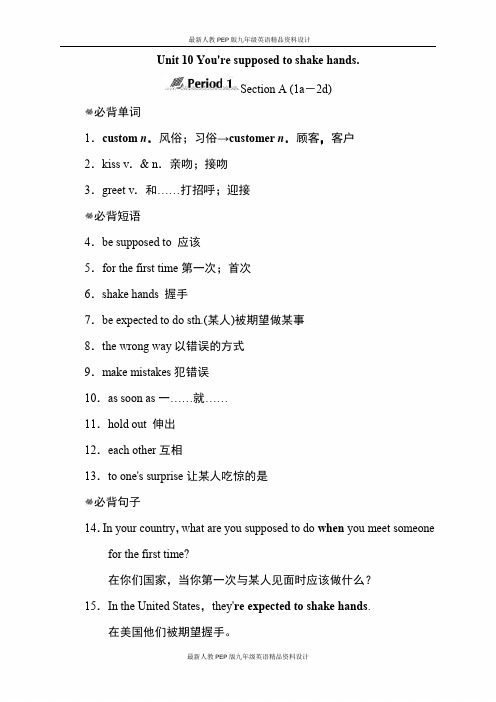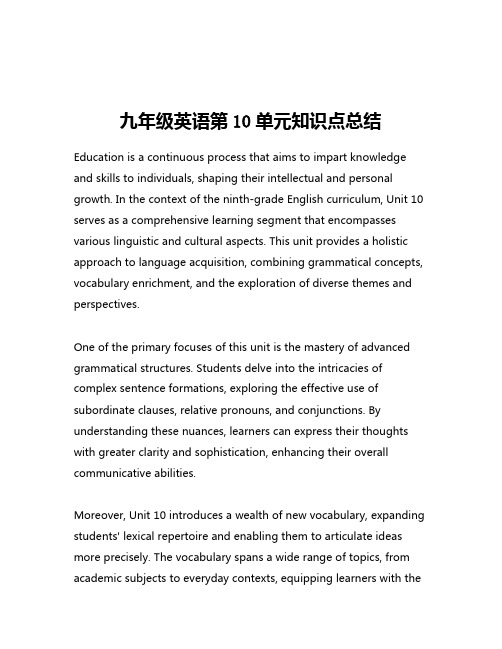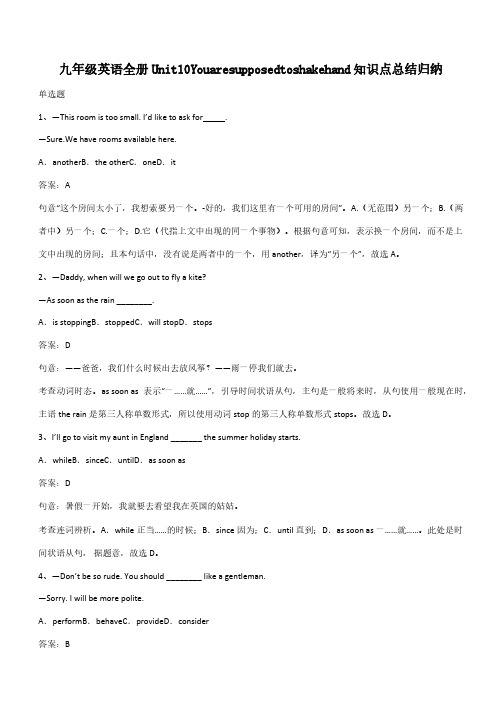初中英语九年级下册考点笔记总结(第10单元)
人教版九年级英语Unit10知识点总结

Unit 10 You一、词性转换Section A1. greet f n.) greeting2. relaxed f Q) relax3. value f (adj.) valuable二短语归纳1. shake hands 握手2. for the first time 第一次;首次3. be expected to 被期望4. arrive at 到达5. make mistakes 犯错误6. as soon as 一 就 ..7. hold out 伸出8. greet each other 相互打招呼9. to one ’ s surprise 使某人吃惊的是10. on both sides of 在 .. 的两边11. find out 查明;弄清 Section B7. basic f (n) base8. gradually f adj.) gradual9. suggestion f (v.) suggest24. go out of one ' s way 特地;格外努力25. make- • • feel at home 使(某 人)感到宾至如归26. because of 由于 27. cut up 切碎 28. get used to 习惯于 29. be excited about 对 .. 感到兴奋30. look forward to doing sth.盼望做某事31. show up 出现三.句型集萃1. be supposed to do sth. 应该做某事2. be expected to do sth. 被期望应该做某事3. It ' s impolite if you 如果你 是不礼貌的4. I wouldn ' t mind that!我不会介意这个5. It ' s + adj. + for sb. to do sth 某人做某事是的6. v. + as + adj + as + sb. can 尽可能 做某事7. It is + adj. + to do sth. 做某事是 的8. keep sb. waiting 让某人等待五、重点句九年级英语re supposed to shake hands4. mad f ( n.) madness5. northern fn(.) north12. everyday lives 日常生活 13. drop by 顺便访问; 随便进入14. make plans to do sth.计划做某事15. on time 准时 16. after all 毕竟;终归 17. get mad 大动肝火;气愤 18. make an effort 作出努力 19. no big deal 没什么大事 20. clean …off 把 .. 擦掉 21. take of 脱下(衣服) ;(飞机等)起飞22. point at 指向;对准1. That ’ s how people in Japan are expected to greet each other. 那是人们在日本彼此打招呼应该做的。
人教版英语九年级unit10知识点总结

人教版英语九年级unit10知识点总结Unit 10 Knowledge Points Summary - A Comprehensive Guide to Mastering EnglishIntroductionEnglish is a universal language that opens up numerous opportunities for communication, education, and career advancement. In unit 10 of the 9th-grade English course, several essential knowledge points are covered. This article aims to provide a comprehensive summary of these points and offer valuable insights to help students master English effectively.1. VocabularyVocabulary acquisition plays a crucial role in language learning. In unit 10, students encounter a variety of vocabulary words related to environment and pollution. To enhance their vocabulary skills, it is beneficial to adopt different strategies, such as reading extensively, using flashcards, and engaging in regular practice exercises. By incorporating new words into daily conversations or writing exercises, students can reinforce their understanding and retention.2. GrammarGrammar is the backbone of any language, including English. In unit 10, students focus on several essential grammar points. Firstly, they learn about the Passive Voice, which is used when the subject of the sentence is acted upon, rather than acting. Understanding the passive voice is essential for effective communication and diverse writing styles.Additionally, students delve into the usage of Modal Verbs, which express ability, possibility, necessity, or permission. Practicing modal verbs in different contexts can significantly improve students' language accuracy and fluency. It is also crucial to grasp the differences between similar modal verbs, such as 'can' and 'could', as well as 'may' and'might'.3. Reading ComprehensionEnhancing reading comprehension skills is vital for understanding complex texts and broadening one's knowledge. Unit 10 introduces students to a variety of reading passages related to environmental issues and conservation efforts. To improve reading comprehension, it is beneficial to scan the text beforehand for contextual clues, skimming for the main idea, and reading actively by underlining or highlighting key points. Students can also practice summarizing the texts to ensure a deeper understanding of the content.4. Listening SkillsListening is an integral part of effective communication. Unit 10 provides listening exercises centered around environmental concerns, such as global warming and deforestation. To enhance listening skills, it is essential to expose oneself to different types of audio resources, including podcasts, songs, and videos. Practicing listening comprehension regularly helps students develop their ability to identify key information, infer meaning from context, and recognize different accents and speech patterns.5. Speaking PracticeUnit 10 encourages students to engage in discussions related to environmental issues. This provides an excellent opportunity for students to express their opinions, debate varying viewpoints, and develop critical thinking skills. To improve speaking proficiency, it is beneficial to participate actively in classroom discussions, join speaking clubs or language exchange programs, and practice pronunciation and intonation patterns regularly.6. Writing SkillsWriting is an essential skill that enables effective expression and communication. In unit 10, students are encouraged to writeargumentative essays or persuasive speeches concerning environmental protection. To improve writing skills, it is crucial to develop a clear thesis statement, organize ideas logically, and provide supporting evidence. Students should also focus on enhancing their vocabulary usage, grammar accuracy, and overall coherence and cohesion in their writing.ConclusionUnit 10 of the 9th-grade English course covers significant knowledge points that are essential to mastering English. It is vital for students to develop vocabulary skills, grasp important grammar concepts, enhance reading and listening comprehension, improve speaking proficiency, and refine writing abilities. By dedicating time and effort to these areas, students will significantly enhance their English language proficiency and open doors to endless opportunities in their personal and professional lives.。
Unit10笔记人教版英语九年级全册

Unit 10 知识梳理总结【词汇梳理】greet(v.和......打招呼;迎接)→ greeting (n. )relax(v.放松;休息)→ relaxed (adj. 放松的;自在的)→ relaxing (adj. 令人放松的)value(n.价值)→valuable(adj.贵重的;宝贵的)→ be of great value很有价值north(n.北;北方;adv.朝北;向北)→northern(adj.北方的;北部的)east(n.东;东方;adv.朝东;向东)→eastern(adj.东方的;东部的)behave(v.表现;举止)→ behavior (n. 行为;举止;态度)→wellbehaved表现好的suggest(v.建议)→ suggestion (n. 建议)drop by(顺便拜访)→ dropped(过去式;过去分词)【短语归纳】shake hands握手be supposed to do 应该做某事for the first time首次;第一次make mistakes犯错误as soon as 一......就...... hold out伸出to one’s surprise令某人惊讶的是find out查明;弄清(情况)the capital of... ......的首都at noon在中午be/get mad at/with sb. 对某人很生气drop by顺便拜访;随便进入as...as sb. can/could某人尽可能...... on time准时after all毕竟;终归get mad大动肝火;气愤make an effort做出努力big deal重要的事;大人物on/at the coast在海边knock on/at the door敲门table manners餐桌礼仪take off脱下(衣服);(飞机)起飞be worth doing值得做...... stick sth. into将某物插入point at指向go out of one’s way特地;格外努力make sb. feel at home使某人感到宾至如归be excited about... 对......感到兴奋look forward to+doing 期望做某事show up出现;露面【考点总结】1.You’re supposed to shake hands.be supposed to 应该,相当于shoulde.g.We are supposed to help each other.=We should help each other.【注】suppose意为“认为;推断”时,其后常接宾语从句,在宾语从句中否定要前移。
最新人教PEP版九年级下册英语Unit 10单元知识点归纳

Unit 10 You're supposed to shake hands.Section A (1a-2d)必背单词1.custom n.风俗;习俗→customer n.顾客,客户2.kiss v.& n.亲吻;接吻3.greet v.和……打招呼;迎接必背短语4.be supposed to 应该5.for the first time第一次;首次6.shake hands 握手7.be expected to do sth.(某人)被期望做某事8.the wrong way以错误的方式9.make mistakes犯错误10.as soon as一……就……11.hold out 伸出12.each other互相13.to one's surprise让某人吃惊的是必背句子14.In your country,what are you supposed to do when you meet someone for the first time?在你们国家,当你第一次与某人见面时应该做什么?15.In the United States,they're expected to shake hands.在美国他们被期望握手。
16.I met a Japanese boy called Sato,and as soon as I held out my hand,he bowed.我遇见了一个叫佐藤的日本男孩,我一伸出我的手,他就鞠了一躬。
17.I held out my hand and to my surprise,she kissed me on both sides of my face! 我伸出了我的手,使我惊讶的是,她亲吻了我的双颊!Section A (3a-4c)必背单词1.value v.重视;珍视n.价值→valuable adj.贵重的;很有用的;宝贵的2.noon n.正午;中午→at noon在正午3.northern adj.北方的;北部的→north n.北方;北部4.knock v.敲;击n.敲击声;敲击→knock at/on敲……5.eastern adj.东方的;东部的→east n.东方;东部6.worth adj.有……价值(的)→be worth doing值得做7.manner n.方式;方法(pl.)礼貌;礼仪→good manners有礼貌8.capital n.首都;国都9.mad adj.很生气;疯的10.effort n.努力;尽力11.passport n.护照12.chalk n.粉笔13.blackboard n.黑板14.coast n.海岸;海滨15.season n.季;季节必背短语16.drop by顺便访问;随便进入17.after all毕竟;终归18.get mad大动肝火;气愤19.make an effort作出努力20.c lean…off把……擦掉21.take off脱下(衣服); (飞机等)起飞必背句子22.Where I'm from, we're pretty relaxed about time.在我们那个地方,我们的时间观念比较随意。
九年级下册英语第十单元知识点

九年级下册英语第十单元知识点九年级下册英语第十单元主要涉及以下知识点:1. 肯定和否定的祈使句:祈使句是用来表达请求、命令、建议或劝告的句子。
在本单元中,我们学习了如何构建肯定和否定的祈使句,以及它们的用法和示例。
2. 倒装句:倒装句是将主语和谓语的词序颠倒的句子结构。
在本单元中,我们学习了两种常见的倒装句:完全倒装句和部分倒装句。
我们还学习了倒装句在特定情况下的应用和意义。
3. 虚拟语气:虚拟语气是用来表达非真实情况或假设的语气。
在本单元中,我们学习了虚拟语气的构成、用法和例句。
我们也学习了虚拟语气在表示建议、要求和愿望等方面的应用。
4. 介词短语的使用:介词短语是由介词和它所搭配的名词、代词、地点名词或动词的-ing形式组成的短语。
在本单元中,我们学习了一些常见的介词短语,并学习了如何正确地使用它们来表达时间、地点、方式和目的。
5. 非谓语动词的用法:非谓语动词是指动词的一种形式,在句子中充当名词、形容词或副词。
在本单元中,我们学习了三种主要的非谓语动词形式:不定式、动名词和现在分词。
我们还学习了它们在句子中的作用和用法。
在学习了以上知识点后,我们能够更加准确地运用祈使句、倒装句、虚拟语气、介词短语和非谓语动词来表达我们的意思。
这些知识点将帮助我们提高英语表达的准确性和流利性,为我们的英语学习打下坚实的基础。
九年级下册英语第十单元的知识点还有:6. 定语从句:定语从句是用来修饰名词或代词的从句。
在本单元中,我们学习了如何构建定语从句以及定语从句的引导词,如that, which, who, whom, whose, when, where等。
我们还学习了定语从句的用法和在句子中的位置。
例如:- The book that I borrowed from the library is very interesting.(我从图书馆借来的那本书很有趣。
)- Linda, who is my best friend, is coming over for dinner.(琳达,我的最好的朋友,要来吃饭。
九年级Unit10英语知识点

九年级Unit10英语知识点1、be supposed to do sth 应该做某事相当于should +动词原形2、shake hands 握手shake hands with sb 与某人握手例句:We usually shake hands with each other .3、bow 鞠躬bow to (before) sb 向某人鞠例句:All the students should bow to their teachers .4、expect 期望预料期待(1)expect to do sth 期待做某事例句:The students expect to get good grades.(2)expect sb to do sth 期待某人做某事例句:I expect you to go to college one day .(3)expect + 从句例句:I expect that you will make great progress .(4)be expected to do sth 被期望做某事应该做某事例句:We are expected to win the match .5、make friends 交朋友make friends with sb 与……交朋友例句:I find it difficult to make friends with him.6、to one’s surprise 使某人吃惊的是例句:To my surprise ,they passed the exam .(be surprised to do sth/be surprised at/in surprise/surprising)7、find out/find/look for8、be relaxed about……对……感到放松(随意)例句:We are relaxed about our breakfast .注意relax/relaxed/relaxing的用法9、spend time with sb 与某人一起度过时光例句:He usually spends time with his children on weekends .10、drop by 顺便拜访后接表示地点或表示某人的名词。
九年级英语第10单元知识点总结

九年级英语第10单元知识点总结Education is a continuous process that aims to impart knowledge and skills to individuals, shaping their intellectual and personal growth. In the context of the ninth-grade English curriculum, Unit 10 serves as a comprehensive learning segment that encompasses various linguistic and cultural aspects. This unit provides a holistic approach to language acquisition, combining grammatical concepts, vocabulary enrichment, and the exploration of diverse themes and perspectives.One of the primary focuses of this unit is the mastery of advanced grammatical structures. Students delve into the intricacies of complex sentence formations, exploring the effective use of subordinate clauses, relative pronouns, and conjunctions. By understanding these nuances, learners can express their thoughts with greater clarity and sophistication, enhancing their overall communicative abilities.Moreover, Unit 10 introduces a wealth of new vocabulary, expanding students' lexical repertoire and enabling them to articulate ideas more precisely. The vocabulary spans a wide range of topics, from academic subjects to everyday contexts, equipping learners with thelinguistic tools necessary for effective communication across various domains.Beyond the linguistic components, this unit encourages students to engage with thought-provoking themes and global perspectives. Through the exploration of diverse texts and multimedia resources, learners gain insights into different cultures, values, and worldviews. This exposure fosters critical thinking, empathy, and cross-cultural understanding, essential attributes for navigating an increasingly interconnected world.Reading comprehension plays a pivotal role in Unit 10, as students analyze and interpret a variety of literary and informational texts. By developing their analytical skills, learners can discern the author's intent, identify rhetorical devices, and draw meaningful connections between ideas. This cultivation of critical reading abilities not only enhances their understanding of the English language but also prepares them for academic and professional pursuits.Additionally, this unit emphasizes the development of productive skills, such as writing and speaking. Students are encouraged to express their ideas through various writing genres, ranging from persuasive essays to creative narratives. Oral communication activities, such as presentations and debates, provide opportunities for learners to hone their public speaking abilities and buildconfidence in their language proficiency.Furthermore, Unit 10 incorporates opportunities for collaborative learning, fostering teamwork, communication, and leadership skills. Through group projects and peer feedback, students learn to respect diverse perspectives, negotiate ideas, and develop a sense of responsibility towards their learning community.In conclusion, the ninth-grade English Unit 10 serves as a comprehensive learning experience that equips students with essential linguistic competencies, critical thinking abilities, and cross-cultural perspectives. By mastering the knowledge and skills imparted in this unit, learners can confidently navigate the complexities of the English language and engage with the broader global community in meaningful and impactful ways.。
九年级英语全册Unit10Youaresupposedtoshakehand知识点总结归纳(带答案)

九年级英语全册Unit10Youaresupposedtoshakehand知识点总结归纳单选题1、—This room is too small. I’d like to ask for .—Sure.We have rooms available here.A.anotherB.the otherC.oneD.it答案:A句意“这个房间太小了,我想索要另一个。
-好的,我们这里有一个可用的房间”。
A.(无范围)另一个;B.(两者中)另一个;C.一个;D.它(代指上文中出现的同一个事物)。
根据句意可知,表示换一个房间,而不是上文中出现的房间;且本句话中,没有说是两者中的一个,用another,译为“另一个”,故选A。
2、—Daddy, when will we go out to fly a kite?—As soon as the rain ________.A.is stoppingB.stoppedC.will stopD.stops答案:D句意:——爸爸,我们什么时候出去放风筝?——雨一停我们就去。
考查动词时态。
as soon as表示“一……就……”,引导时间状语从句,主句是一般将来时,从句使用一般现在时,主语the rain是第三人称单数形式,所以使用动词stop的第三人称单数形式stops。
故选D。
3、I’ll go to visit my aunt in England _______ the summer holiday starts.A.whileB.sinceC.untilD.as soon as答案:D句意:暑假一开始,我就要去看望我在英国的姑姑。
考查连词辨析。
A.while正当……的时候;B.since因为;C.until 直到;D.as soon as一……就……。
此处是时间状语从句,据题意,故选D。
4、—Don’t be so rude. You should ________ like a gentleman.—Sorry. I will be more polite.A.performB.behaveC.provideD.consider答案:B句意:——别这么粗鲁。
- 1、下载文档前请自行甄别文档内容的完整性,平台不提供额外的编辑、内容补充、找答案等附加服务。
- 2、"仅部分预览"的文档,不可在线预览部分如存在完整性等问题,可反馈申请退款(可完整预览的文档不适用该条件!)。
- 3、如文档侵犯您的权益,请联系客服反馈,我们会尽快为您处理(人工客服工作时间:9:00-18:30)。
初中英语九年级下册考点笔记总结(第10单元)Unit10 知识点总结重点词语1. be supposed to do sth 应该做…2. be expected to do sth. 应该/被期望做…3. shake hands (with…) (和…) 握手4. bow to sb. 向某人鞠躬5. for the first time 首次,第一次6. people in Korea 韩国的人们7. greet sb.( in) the wrong way 以错误的方式问候某人8. be invited to sw. 被邀请去…...9. be invited to do sth. 被邀请做…10.welcome party 欢迎会11. as soon as 一… 就…...(引导时间状从)12. as soon as sb can 尽可能快的......13.hold out (my hands) 伸出(我的手)14. on both sides of my face在我的两个脸颊上15. be from= come from 来自16. be relaxed about 对…放松/随意17. a bit/ little late 晚一点18. value the time we spend with sb珍惜我们与某人度过的时间19.in our everyday lives 在我们的日常生活中20. drop by 顺便拜访,随便进入21. make plans ( to do sth.) 计划做某事22. plan to do sth.计划做某事23. on the side of the face在脸的一侧24. the town center 在城镇中心25. as many as sb can = as many as possible 尽可能多的…26. be on time 守时27. the capital of clocks and watches钟表之都28. after all 毕竟,终归29. at noon 在中午30. 15 minutes late 迟到15分钟【重点句型】1. He should have told me about it.他本应该把这件事告诉我。
2. Where I’m from, we’re pretty relaxed about time.我所在的地方,对时间是相当宽松的。
3. We often just drop by our friends’ homes.我们时常去朋友家拜访。
4. Often we just walk around the town center, seeing as many of our friends as we can.我们经常走遍市中心,看尽可能多的朋友。
5.We usually make plans to see friends.通常我们都是做好去看朋友的计划。
6. We’re the land of watches, after all.毕竟,我们是表之乡。
7.It’s even better than I thought it would be.事情比我想象的要好得多。
8.They go out of their way to make me feel at home.他们花尽心血让我感觉不到拘束。
9.Although I still make lots of mistakes, it doesn’t bother me like it used to.尽管我经常出一些错,但它不像过去那样打扰我。
10. I thought that was pretty strange at first, but now I’m used to it.开始,我想那是太奇怪了,但是现在我已经习惯了。
11. I have to say, I find it difficult to remember everything, but I’m gradually getting used to things, and don’t find them so strange any more.不得不承认,我发现记住一切东西是很困难的,但我渐渐习惯了,并且发现他们也不再那么奇怪了。
词汇精讲1. bow(1) bow作名词,意为“弓,弓形物”。
例如:He raised his bow slowly and let the arrow fly.他慢慢地举起弓,让箭飞出去。
The boy made a deep bow to the teacher and ran away.那个孩子向老师深深地鞠了一个躬然后跑掉了。
(2) bow作动词,意为“鞠躬,低下头”。
例如:He bowed his head in shame. 他惭愧地低下头来。
She bowed her thanks. 她鞠躬致谢。
Age had bowed his once straight back.他年事已高,过去挺直的腰板弯了。
2. relaxrelax是动词,可以作不及物动词或及物动词,作及物动词时,宾语是人,表示“使某人放松;使某人休息;使某人轻松”。
例如:Now I want to rest and relax. (作不及物动词)现在我得休息一下,放松放松。
I need a cup of tea to relax myself. (作及物动词)我需要喝杯茶使自己轻松一下。
【拓展】relaxed;relaxing(1) relaxed是形容词,意为“某人感到轻松、放松、不受拘束的”。
指某人“感到”轻松。
通常用来形容人。
有类似用法的词有interested\excited\surprised\bored\tired。
例如:He is feeling relaxed.= He is relaxed. 他感到很轻松。
The song can make me relaxed. 这首歌让我感到轻松。
(2) relaxing是形容词,意为“某事情令人轻松的”,指某事或者某物“令人”轻松。
通常用来修饰物或事。
有类似用法的词有interesting\exciting\surprising\boring\tiring。
例如:The song is relaxing. 这首歌真使人轻松。
You can listen to relaxing music inthe bath!你可以边洗澡边听(令人)轻松的音乐。
3. effort(1) effort作名词,基本含意为“力气;努力”,作此解时只用作单数形式;effort还可以引申表示“努力;奋斗”,作此解时是可数名词;effort还可表示“作品;成就”,为可数名词。
例如:It doesn’t need much effort. 那不需要太多的努力。
A great deal of effort has gone into this exhibition.为了这次展览投入了很大力量。
His efforts were wasted. 他的努力都白费了。
Finishing the work in one day was a very good effort.在一天内完成这项工作是努力的结果。
(2)effort 常用于以下短语make efforts/ make aneffort/ make every effort中,意为“做出努力”,后面常接动词不定式,表示“努力做某事”。
例如:The workers are making efforts to fulfill this year’s plan.工人们正在努力完成今年的生产计划。
The prisoner made an effort to escape, but he couldn’t climb the prison wall.囚犯企图越狱,但是爬不上监狱的墙。
I will make every effort to arrive on time. 我将尽一切努力准时到达。
4. knock(1)knock作动词,意为“敲,击打”。
其后通常跟介词on或at,然后接宾语。
例如:Someone is knocking at/ on the door. 有人敲门。
She knocked at / on the window. 她敲了敲窗户。
(2)knock作名词,意为“敲击声,敲击”。
例如:I heard a knock at the door. 我听到了敲门声。
5. take off(1)takeoff可作“脱下”讲,反义词组为put on,意为“穿上”。
例如:Put on your clothes. Don’t take them off. 把衣服穿上,别脱下。
(2)take off可作“起飞”讲,反义词为land,意为“着陆”。
例如:When will the plane take off? 飞机什么时候起飞?【拓展】常见的含有take的词组:take turns轮流take away拿走take out拿出,取出take over接手,接管take notes 做笔记take care当心,注意take care of 照顾take photos 照相take it easy别紧张6. manner(1)作名词,表示“做事的方法, 事情发生的方式”。
例如:Why are you talking in such astrange manner?你为什么用这种奇怪的方式谈话?(2)作名词,表示“态度, 举止”。
例如:His manner was slightly rude, but you mustn’t mind.他的态度有点粗鲁,但是你千万别介意。
(3)作名词,表示“礼貌, 礼节”,常用复数形式。
例如:It’s bad manners to talk with a full mouth.嘴里吃着东西说话是不礼貌的。
You should have good manners all the time.任何时候都应该有礼貌。
(4)作名词,表示“风俗, 习俗”,常用复数形式。
例如:It is interesting to learn the manners and customs of other countries.了解其他国家的风俗习惯是很有趣的。
7. exchange(1)作动词,意为“交换”,引申可表示“交流”经验、思想等。
例如:The two girls always exchanged Christmas gifts.两个女孩经常交换圣诞礼物。
